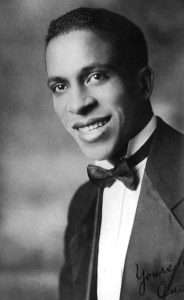
Andy Razaf
Andy Razaf was born on this date in 1895. He was a Black musical lyricist and a major influence in the Black theater during the 1920s.
His name at birth was Andriamanantena Paul Razafinkarefo, and he was a descendant of the royal family of Madagascar. His grandfather, John Lewis Waller, a former slave, became counsel to Madagascar. His mother married the nephew of Queen Ranavalona III before moving to Washington, D.C., where Razaf was born.
Razaf quit school at 16 and worked as an elevator operator, butler, and custodian to help bring money into the home. He moved to Cleveland to become a semi-professional baseball pitcher for a Negro League, briefly playing for the New York Black Sox team. He also wrote newspaper articles, speeches, poems, and ragtime songs.
He wrote his first song, "Baltimo" at 13. In 1921, he returned to New York and soon made a living as a songwriter. His first significant lyrical contribution came with Joe Hurtig’s Social Maids Show a year later. During the 1920s, Razaf was a fixture of Harlem’s nightclub scene, collaborating with many notable composers and players, Willie “the Lion” Smith, Eubie Blake (with whom he wrote Memories of You), James P. Johnson, and others. At this time, Razaf met Fats Waller and became friends.
Together, the two wrote some of the most renowned popular songs of the 20th century. Among their compositions were Honeysuckle Rose, My Fate Is in Your Hands (1928), Ain’t Misbehavin, Blue Turning Grey over You (1929), Keeping Out of Mischief Now (1932), and The Joint Is Jumpin' (1938). One of the duo’s most famous songs, What Did I Do to Be So Black and Blue (1929), displayed Razaf’s longstanding concern with racial injustice. Although Louis Armstrong’s influential version interpreted the song regarding white racism towards Blacks, Razaf’s original lyrics were also directed at interracial bias against darker-skinned Blacks.
The greatest vocalists and players of jazz and popular music of the Roaring Twenties and 1930s performed Razaf’s music. During this time, he was briefly married to Jean Blackwell Hudson. After Tan Manhattan (1940), Razaf moved to Englewood, New Jersey, where he failed at an attempt to enter politics. He moved to Los Angeles, living the remainder of his life in relative obscurity.
In 1972, at 76, the most prolific Black lyricist of 20th-century popular music was finally recognized by his Tin Pan Alley peers in the Songwriters Hall of Fame. Andy Razaf died of kidney disease on February 3, 1973.
Jazz: A History of the New York Scene
Samuel Charters and Leonard Kunstadt
(Doubleday, Garden City, N.Y., 1962)